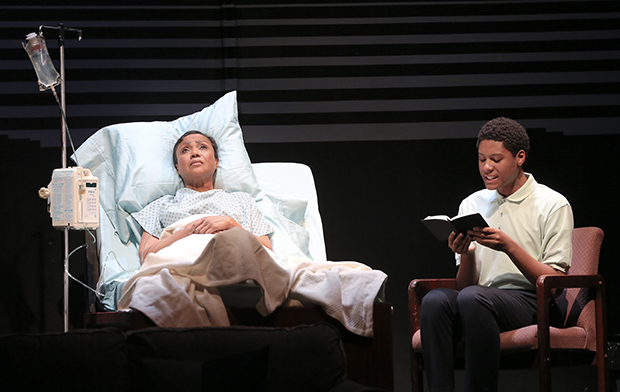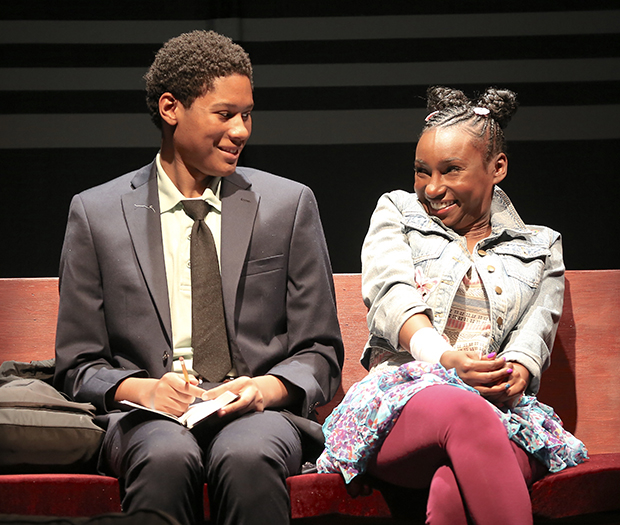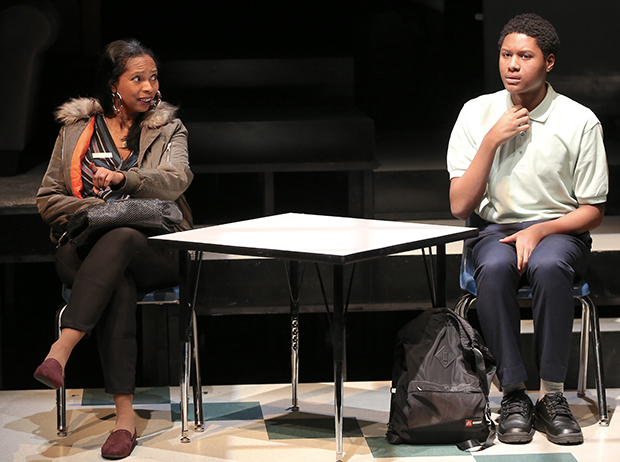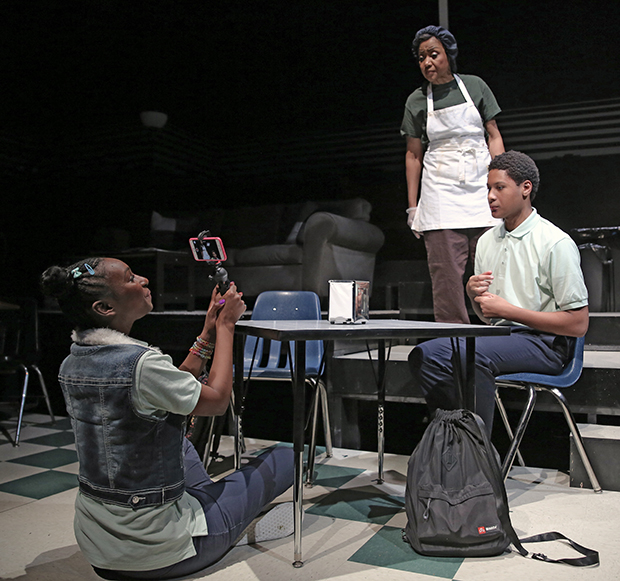God Helps Those Who Help Themselves in Surely Goodness and Mercy

(© Carol Rosegg)
The devout will immediately recognize the title of Chisa Hutchinson's Surely Goodness and Mercy from Psalm 23, a song of David about putting one's faith in God. But if the Lord is our shepherd, he is a negligent one, too often leaving us to the custody of wolves. That story bears out clearly in this otherwise mushy New York premiere from Keen Company at Theatre Row.
It's about Tino (a sympathetic Jay Mazyck), a 12-year-old black kid living in Newark with his Aunt Alneesa (Sarita Covington) following the untimely death of his mother. Confused and looking for guidance, he spends hours at his local church. He's a stellar student, something that intimidates his friend Deja (Courtney Thomas), but impresses outwardly-mean-but-secretly-nice lunch lady Bernadette (the wily Brenda Pressley). She doesn't like kids, but she likes Tino and he likes her back — which is why he becomes so worried when he discovers that she is suffering from a chronic medical condition. He wants to help her, and Bernadette may just be in a position to help him back.

(© Carol Rosegg)
In a brief program note, Hutchinson reveals that Surely Goodness and Mercy is meant to be an answer to the "White Savior Narrative," a popular trope that shows a kindly white person plucking a talented black person from poverty and setting them on the road to success. This year's Oscar winner for Best Picture, Green Book, has been widely accused of following that narrative. Dismantling it is an admirable goal, but one wishes the wrecking ball didn't take the form of an equally cliché-ridden Hallmark-movie plot. Surely Goodness and Mercy features a sensitive young man, a sassy gal pal, a curmudgeon with a heart of gold, and a wicked aunt.
Even so, there are flashes of brilliance in the script: Not only does Tino win the undying admiration of the off-Broadway audience by challenging his English teacher on a point of grammar (he's right), but the scene allows Hutchinson to show the insidious way society beats down clever kids from disadvantaged backgrounds. While an upper-middle-class white boy might be praised for showing the initiative to question authority, Tino is sent to the principal's office for violating the school's "zero tolerance" policy on disrespecting teachers. His aunt further enforces this policy by attempting to beat Tino's back talk out of him, letting him know that his poor, black intelligence is not valued.

(© Carol Rosegg)
Covington is fearsome as Aunt Alneesa, a villain who thinks she is a victim (as the best ones do). Unfortunately, the role feels underdeveloped, and Alneesa disappears right as her motivation becomes apparent. This is too bad, since Hutchinson unearthed the layers of a similarly monstrous maternal figure with startling clarity in Somebody's Daughter.
Unlike that much sharper play, Surely Goodness and Mercy tends to meander. Extended scenes feature Tino staring out at the audience as a Baptist preacher sermonizes, or a school principal scolds (Cezar Williams voices these lines over the God mic). These disembodied voices may be Hutchinson's way of commenting on the authority figures in Tino's life, men who feel just as distant to him as God does to us. If so, it proves to be a ponderous metaphor in practice.

(© Carol Rosegg)
Jessi D. Hill's uninspired direction does little to alleviate that, and even makes it worse with a series of overly long blackouts and a completely unnecessary intermission in this 90-minute show. Sure, this time is used for a small set change, but that is more of an indictment of Lee Savage's non-set: little clusters of furniture that resemble the saddest Raymour & Flanigan showroom ever. Devorah Kengmana competently lights sections of that set depending on when they are being activated, but she is not able to prevent the whole stage from appearing dull and dusty.
Surely Goodness and Mercy feels like the rough draft of a much better play, but the title indicates that Hutchinson is on the right track: So many people spend their lives waiting for a shepherd, and end up being eaten alive.










